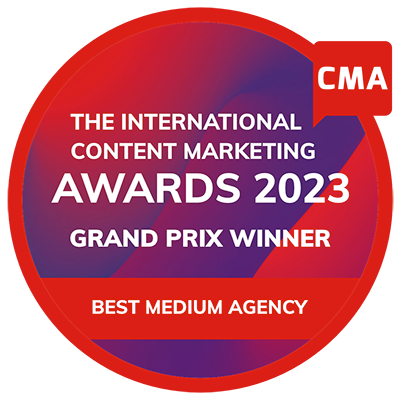
Content marketing for luxury brands after COVID-19
Jessica Bennett,
-
DOWNLOAD
Your Content Marketing Checklist >

-
FIND OUT MORE
Our High-Quality Report Design Service >

-
REQUEST TODAY
A Free Content Consultation >

We have previously written about the challenges of content marketing for luxury brands. A luxury brand’s digital content strategy needs to highlight their products’ unique elements – heritage, craftsmanship and exclusivity – within the ephemeral, fast moving and superficial environment that is the digital landscape.
These considerations about high-end branded content have been made all the more complicated by the coronavirus pandemic.
Content marketing for luxury brands during the pandemic
One of our latest blogs looked at marketing during the coronavirus epidemic, including how brands are responding and what helpful things they’re doing for consumers. Many of these initiatives have focused on the practical – flexible payment terms, free services, helping to produce essential supplies, etc.
But many brands are winning at marketing during the coronavirus pandemic by focusing on something more abstract – well-being. This is a particularly useful tool for luxury content marketing. Nobody needs high-end handbags and couture clothing to stay at home, and five-star holidays may seem daunting now. But according to Global Web Index, brands providing light-hearted and fun content to entertain people have 77% approval from consumers.
That’s not to say luxury brands are not being practical. LVMH was one of the first brands to repurpose its manufacturing facilities to make hand sanitiser and is now producing face masks and hospital gowns. Similarly, after donating $10 million to help in the fight against coronavirus, Ralph Lauren made another significant contribution to the Royal Marsden NHS Foundation Trust – a cancer centre in London with which the fashion house has a longstanding relationship – to help with testing for COVID-19.
There is still a place for luxury marketing during the coronavirus outbreak. Chris Gray Psy.D., founder of consumer psychology consultancy Buycology, commented:
"Luxury items provide a sense of possibility and freedom to dream. When you are in the middle of a crisis, it is hard to dream. People are focused on the day-to-day versus being able to think about how life may be better in the future. This opens another opportunity for luxury brands to be able to provide people with that sense of aspiration and possibility.”
That being said, luxury products are also low priority when people are asked to look ahead after the outbreak, with just 5% of people saying they will prioritise the purchase of a luxury product after this.
However, just because it’s not a priority purchase doesn’t mean the purchase does not exist. Many will see a luxury splurge as a treat for making it through a difficult time. What’s certain is those brands that have been catering to consumer well-being will be at the forefront of people’s minds.
Burberry were quick to find a tech solution when their stores were forced to close at the beginning of the pandemic. The brand invited influencer Yvonne Ching to visit its store in Shanghai and livestream her experience on Tmall. The session achieved more than 1.4 million views and most of its featured products subsequently sold out.
Meanwhile, luxury travel brand Aman Resorts forecasted that wellness will be a key travel trend when it’s allowed again. They are releasing inspirational videos that shun flashy beachside imagery in favour of scenes of tranquillity, peace and calm. Their messaging reflects this: “When the time is right we welcome you to come, rest, and replenish.”
The future of content marketing for luxury brands
Though there are already signs of recovery in China, where the virus first hit, it is expected that southern Europe will take longer to recover due to the prolonged nature of the outbreak there. Shops have been closed for longer and travel restrictions remain in place.
When considering their future content marketing strategy, luxury brands will have to rethink what they offer, taking into account social distancing, reduced spending power, restricted travel and disrupted supply chains.
There are several key themes emerging in high-end branded content and luxury brands should adapt their content marketing accordingly:
1. Recognise changing customer sentiments among luxury consumers
Luxury brands should anticipate shifts in consumer sentiment and behaviour.
"One trend that is likely to intensify post-crisis is the trend toward sustainability and the desire for more responsible consumption – reinforcing the need for companies to provide clear, detailed information about their processes and products,” forecasts McKinsey & Company.
Understandably, consumers have become preoccupied with where products come from, and the hygiene and cleanliness of the source, so emphasising no-to-low-contact production and distribution should be a priority for luxury brands.
However, reports of falling carbon emissions during the lockdown and the natural world thriving due to less human interruption – such as the return of wildlife to the canals in Venice – mean that consumers’ attentions have been turned towards the eco-friendly. While used to sharing content that reveals the craftsmanship behind a product, luxury brands should also look to offer exclusive, behind-the-scenes content focusing on what’s being done to produce items ethically.
Luxury eco-tourism is a natural winner here. It already prioritises individual and private experiences away from crowds while conserving the destination. Idyllic and remote locations with amenities such as private airport transfers and personal chefs in-house will become all the more appealing, and luxury brands should produce content to highlight the safety aspect of these traditional selling points.
2. Bring luxury to the audience
Some consumers will go to stores once they reopen, perhaps in masks and gloves, and will expect the same protective measures from sales associates. However, others will fear going out and will rely on online shopping.
For the near future, luxury brands should focus on finding ways to make their digital or in-home offering as attractive and attentive as their in-store offering (by establishing a brand community or perfecting a luxury social media strategy).
Bespoke and carefully curated brand magazines and other direct mail options featuring high-end branded content are likely to increase in popularity. The tangibility of luxury print magazines invites consumers to delve into your brand and its world, making consumers feel like they are getting an experience in their home when they sit down to read. Harnessing this medium will promote brand loyalty for your existing customers and is also a great way to showcase new products outside a physical store.
UK magazine publishers are already reporting a triple-digit surge in new print (and digital) subscriptions. Insight from magazine.co.uk, the leading magazine subscription website in the UK, and pocketmags.com, the fast-growing international digital newsstand, reveals that the first week of lockdown saw a huge increase in print magazine subscription page views, peaking at the end of March 2020.
Along this this theme, where luxury e-commerce is thriving, premium packaging might also see a resurgence, as brands look to mimic the luxury store experience in someone’s home.
But don't forget your digital footprint - high quality, relevent and regular digital content telling your brand and product stories will keep luxury brands front of mind as coronavirus restrictions end and consumers strart returning. In this article on Luxury Daily, Mark Coronna from Minneapolis-based Chief Outsiders explains that effective digital content is vital to help you gain the edge above competitors. He presents a content checklist:
There is a consistent set of criteria that I use to evaluate content effectiveness. These criteria are useful in designing, authoring and evaluating nearly all forms of content. The criteria are:
- Intrusive: Will it get readers’ attention?
- Believable: Are the claims made both clear and reasonable?
- Credible: Does it contain facts and third-party endorsements or awards?
- Customer-centric: Does it stress benefits, applications or features?
- Memorable: Will readers be able to associate the offer with the brand or company?
- Actionable: Does the content inspire readers to take action?
This content checklist can be used for all forms of content, such as Web site pages, social media posts, ads, articles, e-books, sales collateral and email campaigns.
Digital content, luxury print and packaging and well-planned digital customer journeys through the sales funnel are vital. Digital advertising, social media, influencers and SEO should all be of consideration.
Read our guide to SEO for luxury brands.
If it is safe to do so, offering video personal shopping experiences and virtual walkthroughs of your store or showroom is a good way of bringing the physical shopping experience into someone’s home. Pair this with video or phone consultations with sales staff and the experience becomes even more similar to what consumers expect from a luxury brand.
3. Invest in digital innovations
Even though more than 90% of luxury sales take place in physical stores, the journey to that final in-store purchase almost always starts online. Therefore, the challenge for digital content marketing for luxury brands is pretty much the same, it has just been accelerated by the COVID-19 pandemic. How can luxury brands create digital experiences that replicate the in-person experience?
With the world of work and socialising changing, consumers are increasingly comfortable on platforms such as Zoom or Google Hangout, through which luxury brands can communicate and introduce video personal shopping and store walkthroughs, as mentioned above.
Luxury automotive brand Jaguar Land Rover was quick to respond to the coronavirus pandemic and the closure of physical showrooms. Having previously been available to just 5% of customers, Jaguar Land Rover made its online virtual showroom available to all.
Just like the in-store experience, customers can create the car they want online and purchase it ‘at the click of a button’, with socially distanced delivery to their home.
Jaguar Land Rover is no stranger to digital innovation. It already showcases its new vehicles using world-leading Virtual Reality Experience packs so that customers don’t need to wait for newly launched vehicles to arrive in their local showroom. This latest extension simply enables the digital sales process, too.
A spokesperson from Jaguar Land Rover explained: “To help inform customers, new virtual showrooms have been created with video presentations to showcase all Jaguar and Land Rover models. Phone and video sales appointments are available so that customers can talk directly to specialist consultants to answer questions and discuss specific needs, removing the need to visit a showroom.”
The first vehicle ordered through the service was a £119,000 Range Rover. Clearly digital does not dampen the appetite for spending.
Luxury brands have been accused of being slow to adapt to digital innovations, relying heavily on in-person activities. However, in the wake of the COVID-19 pandemic, a smooth and interactive digital experience supported by multi-platform content marketing will become what’s expected from luxury brands. This might finally be the push brands need to embrace technology such as artificial intelligence (AI), virtual reality (VR) and augmented reality (AR), which have been at our fingertips for some time, but lacked commitment and investment.
One of our latest blogs looked at marketing during the corona virus epidemic, including how brands are responding and what helpful things they’re doing for consumers. Many of these initiatives focus on the practical – flexible payment terms, free services and helping to produce essential supplies.
4. A focus on well-being
As mentioned at the beginning of this article, many brands are winning at marketing during the coronavirus pandemic by focusing on well-being.
By acknowledging what is going on now, but looking to the future when this is over, brands are able to offer hope and comfort to worried consumers. In this way, they are keeping the brand top of mind without being crass.
How are luxury brands marketing during coronavirus?
So, what are luxury brands doing? Sticking with the luxury fashion theme, on social media Louis Vuitton is inviting everyone at home to “escape in the evocative imagery of [their] celebrated ‘Spirit Of Travel’ campaign,” cleverly tying in their products with a time when this is all over and we can actually travel again. They’ve also been using their established omni-channel platform to create WeChat pop-up shops, allowing sales associates to continue selling to customers in a personalised, bespoke way.
Burberry were also quick to find a tech solution, inviting influencer Yvonne Ching to visit its store in Shanghai and livestream her experience on Tmall. The session achieved more than 1.4 million views and most of its featured products subsequently sold out.
Similar to Louis Vuitton, Emporio Armani’s ‘A Tribute To Cities’ on social media honours the great cities of the world and their inhabitants, “the drivers of that creativity, dynamism and life which inspire us all,” which neatly draws on the comforting “we’re all in this together” messaging popular across the marketing world at the moment.
Luxury sports brand Sweaty Betty has gone into content creation overdrive with its ‘Workouts + Wellbeing’ brand community. Not only is the brand providing its customers with the obvious in-home workouts, but it is branching out to offer healthy recipes, wellness advice and virtual challenges. Bringing people together and offering well-being advice makes Sweaty Betty an essential for its consumers getting through the crisis.
The future of luxury content marketing
There’s no doubt that, for now, luxury brands need to focus on weathering the storm.
For the near future, luxury brands should focus on finding ways to make their digital or in-home offering as attractive and attentive as their in-store offering by establishing a brand community, perhaps?
Luxury brands should also anticipate shifts in consumer sentiment and behaviour. “One trend that is likely to intensify post-crisis is the trend toward sustainability and the desire for more responsible consumption – reinforcing the need for companies to provide clear, detailed information about their processes and products,” forecasts McKinsey & Company.
Vogue China’s editor in chief Angelica Cheung echoed this sentiment. In a recent interview for The Times Magazine, she revealed how the lockdown had made her question the efficiency of flying around the world several times a year to view fashion shows that are easily streamed online. The whole luxury fashion industry looks set to change its approach.
Indeed, if the function of luxury marketing is to uplift us during a crisis by sharing beautiful content that boosts well-being, then surely the creation of this content should similarly boost the well-being of its source. Eco-luxury is on the horizon (when we’re eventually allowed to travel there).
Or give these cool blogs a read
See more from the blogWhat to look for when working with a content marketing agency
Are you missing out on valuable brand partnerships?
Monetising car membership clubs
Dialogue named Best Content Agency for the second year running
Dialogue creates award-winning multichannel content that inspires, informs and excites your audience. We are a team of marketing specialists in print, online platforms, email communications, magazines, video creation, digital media and more.












